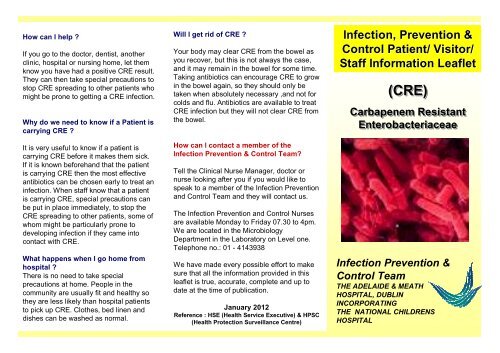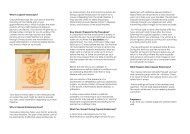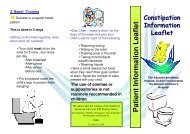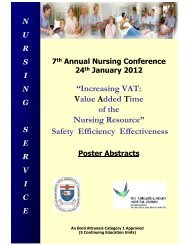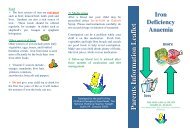CRE - Adelaide and Meath Hospital, Dublin Incorporating the National
CRE - Adelaide and Meath Hospital, Dublin Incorporating the National
CRE - Adelaide and Meath Hospital, Dublin Incorporating the National
You also want an ePaper? Increase the reach of your titles
YUMPU automatically turns print PDFs into web optimized ePapers that Google loves.
How can I help ?<br />
If you go to <strong>the</strong> doctor, dentist, ano<strong>the</strong>r<br />
clinic, hospital or nursing home, let <strong>the</strong>m<br />
know you have had a positive <strong>CRE</strong> result.<br />
They can <strong>the</strong>n take special precautions to<br />
stop <strong>CRE</strong> spreading to o<strong>the</strong>r patients who<br />
might be prone to getting a <strong>CRE</strong> infection.<br />
Why do we need to know if a Patient is<br />
carrying <strong>CRE</strong> ?<br />
It is very useful to know if a patient is<br />
carrying <strong>CRE</strong> before it makes <strong>the</strong>m sick.<br />
If it is known beforeh<strong>and</strong> that <strong>the</strong> patient<br />
is carrying <strong>CRE</strong> <strong>the</strong>n <strong>the</strong> most effective<br />
antibiotics can be chosen early to treat an<br />
infection. When staff know that a patient<br />
is carrying <strong>CRE</strong>, special precautions can<br />
be put in place immediately, to stop <strong>the</strong><br />
<strong>CRE</strong> spreading to o<strong>the</strong>r patients, some of<br />
whom might be particularly prone to<br />
developing infection if <strong>the</strong>y came into<br />
contact with <strong>CRE</strong>.<br />
What happens when I go home from<br />
hospital ?<br />
There is no need to take special<br />
precautions at home. People in <strong>the</strong><br />
community are usually fit <strong>and</strong> healthy so<br />
<strong>the</strong>y are less likely than hospital patients<br />
to pick up <strong>CRE</strong>. Clo<strong>the</strong>s, bed linen <strong>and</strong><br />
dishes can be washed as normal.<br />
Will I get rid of <strong>CRE</strong> ?<br />
Your body may clear <strong>CRE</strong> from <strong>the</strong> bowel as<br />
you recover, but this is not always <strong>the</strong> case,<br />
<strong>and</strong> it may remain in <strong>the</strong> bowel for some time.<br />
Taking antibiotics can encourage <strong>CRE</strong> to grow<br />
in <strong>the</strong> bowel again, so <strong>the</strong>y should only be<br />
taken when absolutely necessary ,<strong>and</strong> not for<br />
colds <strong>and</strong> flu. Antibiotics are available to treat<br />
<strong>CRE</strong> infection but <strong>the</strong>y will not clear <strong>CRE</strong> from<br />
<strong>the</strong> bowel.<br />
How can I contact a member of <strong>the</strong><br />
Infection Prevention & Control Team?<br />
Tell <strong>the</strong> Clinical Nurse Manager, doctor or<br />
nurse looking after you if you would like to<br />
speak to a member of <strong>the</strong> Infection Prevention<br />
<strong>and</strong> Control Team <strong>and</strong> <strong>the</strong>y will contact us.<br />
The Infection Prevention <strong>and</strong> Control Nurses<br />
are available Monday to Friday 07.30 to 4pm.<br />
We are located in <strong>the</strong> Microbiology<br />
Department in <strong>the</strong> Laboratory on Level one.<br />
Telephone no.: 01 - 4143938<br />
We have made every possible effort to make<br />
sure that all <strong>the</strong> information provided in this<br />
leaflet is true, accurate, complete <strong>and</strong> up to<br />
date at <strong>the</strong> time of publication.<br />
January 2012<br />
Reference : HSE (Health Service Executive) & HPSC<br />
(Health Protection Surveillance Centre)<br />
Infection, Prevention &<br />
Control Patient/ Visitor/<br />
Staff Information Leaflet<br />
(<strong>CRE</strong>)<br />
Carbapenem Resistant<br />
Enterobacteriaceae<br />
Infection Prevention &<br />
Control Team<br />
THE ADELAIDE & MEATH<br />
HOSPITAL, DUBLIN<br />
INCORPORATING<br />
THE NATIONAL CHILDRENS<br />
HOSPITAL
What is <strong>CRE</strong> ?<br />
<strong>CRE</strong> st<strong>and</strong>s for Carbapenem Resistant<br />
Enterobacteriaceae. <strong>CRE</strong> are bugs (bacteria)<br />
that live in <strong>the</strong> bowel.<br />
In most people, <strong>CRE</strong> bugs are carried in <strong>the</strong><br />
bowel harmlessly <strong>and</strong> do not cause infection.<br />
However if a Patient is prone to infection <strong>and</strong><br />
<strong>the</strong> infection is caused by <strong>CRE</strong>, it can be<br />
difficult to treat, because many of <strong>the</strong><br />
commonly used antibiotics will not work<br />
against <strong>CRE</strong>.<br />
Can <strong>CRE</strong> be harmful ?<br />
For most Patients, <strong>CRE</strong> lives harmlessly in<br />
<strong>the</strong> bowel <strong>and</strong> does not cause infection. This<br />
is because <strong>the</strong> person’s immune system<br />
controls <strong>the</strong> <strong>CRE</strong> in <strong>the</strong> bowel <strong>and</strong> prevents<br />
it from spreading elsewhere in <strong>the</strong> body.<br />
Sometimes <strong>CRE</strong> can cause infections in<br />
patients, for example when <strong>the</strong>y are very ill<br />
or while receiving chemo<strong>the</strong>rapy. <strong>CRE</strong> can<br />
cause infections, such as kidney infections,<br />
wound infections or in severe cases,<br />
infection of <strong>the</strong> blood.<br />
Antibiotics are needed to treat <strong>CRE</strong> infection.<br />
How do people get <strong>CRE</strong> ?<br />
• Patients who have already taken lots of<br />
antibiotics are more at risk of picking up <strong>CRE</strong>.<br />
The reason for this is that <strong>the</strong> more bugs are<br />
exposed to antibiotics, <strong>the</strong> more likely <strong>the</strong>y will<br />
develop “ resistance “ to that antibiotic, so<br />
that antibiotic no longer works.<br />
• <strong>CRE</strong> is more common in certain countries<br />
than o<strong>the</strong>rs – if you have been a patient in a<br />
hospital abroad in <strong>the</strong> past year, you need to<br />
let your doctor know, especially if you are<br />
being admitted to an Irish hospital, so that<br />
<strong>the</strong>y can test for <strong>CRE</strong>.<br />
• Patient’s, Healthcare workers <strong>and</strong> Visitors<br />
can be carriers of <strong>CRE</strong>. It can spread<br />
between patients through direct contact with<br />
each o<strong>the</strong>r or by touching items or surfaces<br />
that <strong>the</strong> person with <strong>CRE</strong> may have touched<br />
such as bed rails, toilets or equipment.<br />
As patients in hospital are much more<br />
vulnerable to infection than patients in <strong>the</strong>ir<br />
own homes, special precautions are required<br />
to prevent <strong>the</strong> spread of <strong>CRE</strong> between<br />
patients in hospital.<br />
What are <strong>the</strong> special precautions for<br />
patients with <strong>CRE</strong> ?<br />
The precautions are designed to prevent<br />
<strong>CRE</strong> spreading between patients on <strong>the</strong><br />
ward. If you are found to have <strong>CRE</strong> you will<br />
be cared for in an isolation room with your<br />
own toilet or commode. Staff or visitors will<br />
wear gloves <strong>and</strong> aprons before entering<br />
your isolation room <strong>and</strong> before coming into<br />
contact with you, to protect <strong>the</strong>ir h<strong>and</strong>s <strong>and</strong><br />
clo<strong>the</strong>s from <strong>CRE</strong>.<br />
Patients, staff <strong>and</strong> visitors must pay special<br />
attention to h<strong>and</strong> hygiene. All staff must<br />
clean <strong>the</strong>ir h<strong>and</strong>s before <strong>and</strong> after any<br />
contact with every patient, regardless of<br />
whe<strong>the</strong>r or not <strong>the</strong>y have <strong>CRE</strong>.


